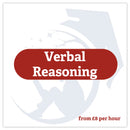Description
VERBAL REASONING
Verbal reasoning is the ability to understand concepts expressed in words. It incorporates a combination of both literacy and numeracy, and assesses a student’s ability to process information and engage with language to solve problems. Despite common belief, verbal reasoning does not rely on prior learned material from school, but rather it assesses one’s mental capacity to think critically. Therefore, a child’s aptitude for verbal reasoning is often a strong indicator of their raw intelligence and academic potential in a range of different subjects.
Verbal reasoning is not taught as part of the National Curriculum at school, meaning that students are not taught any of the essential techniques needed for this exam. Therefore, it is particularly important for a child to begin practising verbal reasoning so that they are sufficiently and equally prepared for all four 11 Plus exams. Familiarising a child with verbal reasoning from an early age is particularly crucial as it allows them to overcome the complexity of this exam well head of the average student, ensuring that they will complete this exam with ease. It should also be noted that students who are excellent in English and Mathematics do not automatically perform well in this exam as it is tests an entirely different set of skills.
In the verbal reasoning exam, students are required to answer questions in a range of different formats. This not only makes the exam challenging but also quite enjoyable for students. Styles of questions include:
- Identifying the odd word in a series of words
- Filling in gaps with letters to formulate a word
- Matching words with their corresponding synonyms
- Spotting antonyms from a word bank
- Decoding a string of letters to form a word using a code sheet
- Solving numerical calculations
- Identifying the next number in a sequence
Payment & Security
Your payment information is processed securely. We do not store credit card details nor have access to your credit card information.








